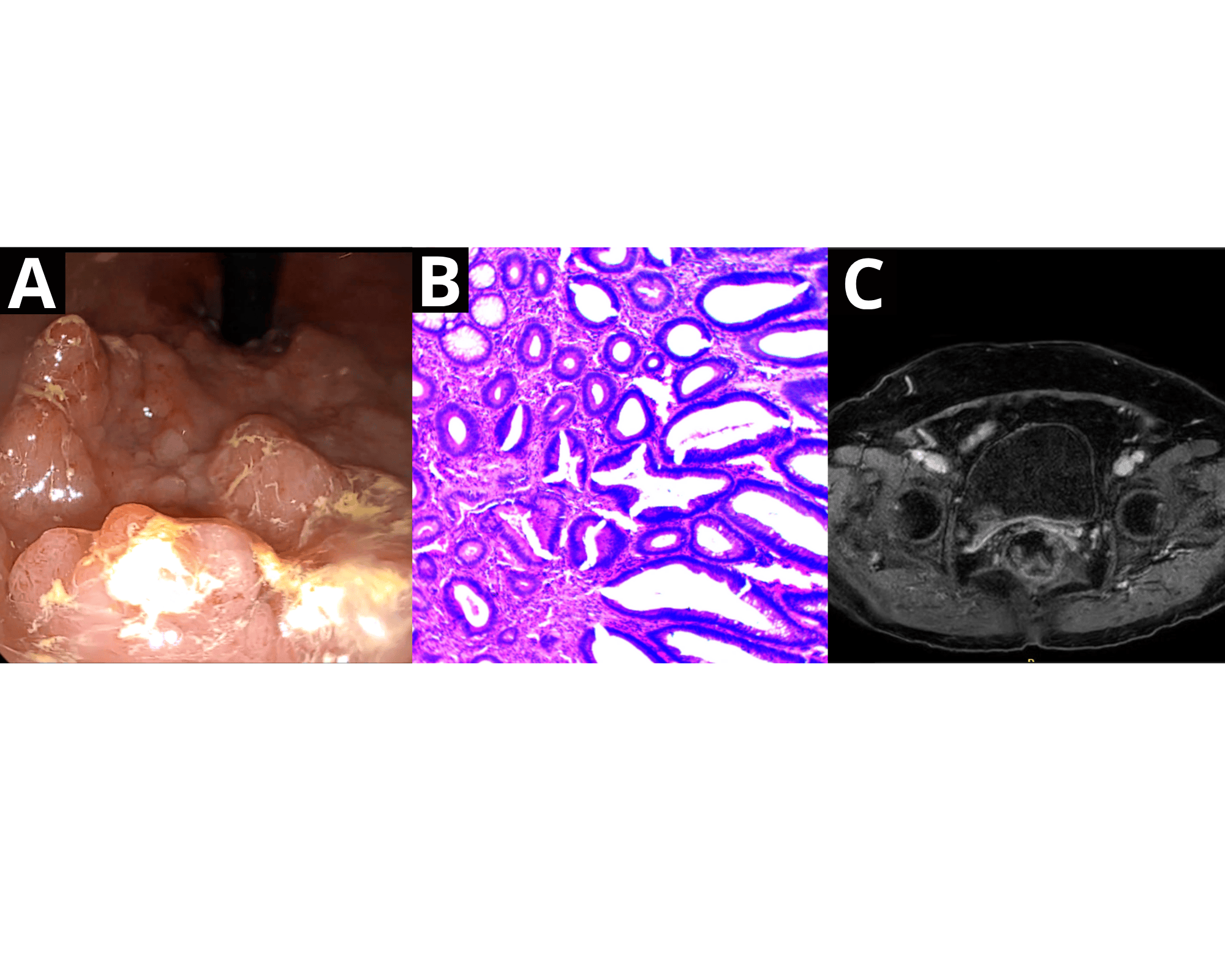Sunday Poster Session
Category: Colon
P0417 - Electrolyte Imbalance and Chronic Diarrhea: Unmasking McKittrick-Wheelock Syndrome
.jpg)
Sergio Manzur, MS (he/him/his)
Universidad Católica de Santiago de Guayaquil
Guayquil, Guayas, Ecuador
Presenting Author(s)
1Hospital Alfredo G. Paulson, Guayaquil, Guayas, Ecuador; 2Universidad Católica de Santiago de Guayaquil, Guayaquil, Guayas, Ecuador
Introduction:
McKittrick-Wheelock syndrome is an infrequent clinical condition associated with large distal colorectal tumors, usually secondary to the presence of a hypersecretory colorectal villous adenoma. Patients typically present with life-threatening hyponatremia, hypokalemia, and acute kidney injury. Timely recognition is critical, as these tumors may be the initial manifestation of an otherwise asymptomatic colorectal neoplasm.
Case Description/
Methods:
An 81-year-old woman seeked medical consultation after experiencing watery diarrhea for the past two months. Physical examination revealed signs of dehydration, hypotension, tachycardia and substantial weight loss (22lbs). She has no significant medical background and a diagnosis of chronic diarrhea was established.
A digital rectal examination identified a soft, non-compressible mass. Laboratory tests indicated hyponatremia (124.0 mmol/L) and elevated creatinine (7.41 mg/dL). Subsequently, a colonoscopy was performed, which identified a laterally growing, exophytic lesion extending from the pectineal line to 8 cm from the anal verge, occupying approximately 70% of the rectal circumference. Biopsy unveiled elongated, finger-like projections extending away from the muscularis mucosae. The epithelium displayed crowded, pseudostratified cells with elongated nuclei, showing low-grade dysplasia and isolated atypia. These findings confirmed the diagnosis of a low-grade tubulovillous adenoma.
Accordingly, the patient was referred to the surgical team for transanal resection. Her clinical status was stabilized, and complete excision of the lesion was achieved. The patient recovered successfully and remains in good health.
Discussion:
This case highlights the importance of considering McKittrick–Wheelock syndrome in the differential diagnosis of severe metabolic disturbances in patients with a history of chronic diarrhea. Recognition of this syndrome is crucial, as secretory villous adenomas may be the initial manifestation of an otherwise asymptomatic colorectal neoplasm. Villous adenomas represent approximately 5% of all colorectal adenomas, with about 3% exhibiting hypersecretory behavior, often correlated with lesion size. Therefore, chronic diarrhea should be thoroughly investigated, as it represents an alarm symptom, particularly in patients over 50 years of age. Early recognition of gastrointestinal symptoms is thus essential to facilitate timely diagnosis and management, which can significantly improve patient outcomes.
Figure: (A) Retroflexed view of the rectum showing a granular, laterally spreading lesion with non-homogeneous appearance, involving 70% of the rectal circumference. (B) Elongated, finger-like projections extend from the muscularis mucosae. The epithelium is composed of crowded, pseudostratified cells with elongated nuclei, exhibiting low-grade dysplasia and focal cytologic atypia. Ovoid glands lined by cuboidal epithelium with low-grade dysplasia are present within a stroma containing mononuclear inflammatory infiltrate and vascular congestion. Findings are consistent with a colonic low-grade tubulovillous adenoma. (C) Tumoral lesion located in the lower rectum and anal canal, 37 mm from the external anal margin, without evidence of involvement of the sphincter complex
Disclosures:
Francisco Cano indicated no relevant financial relationships.
Angela Cruz indicated no relevant financial relationships.
Monica Guillen indicated no relevant financial relationships.
Sergio Manzur indicated no relevant financial relationships.
Wilton Cueva indicated no relevant financial relationships.
Daniel Leal indicated no relevant financial relationships.
Maria Jose Cueva indicated no relevant financial relationships.
Francisco Cano, MD1, Angela Cruz, MD1, Monica Guillen, MS2, Sergio Manzur, MS2, Wilton Cueva, MS2, Daniel Leal, MS2, Maria Jose Cueva, MD2. P0417 - Electrolyte Imbalance and Chronic Diarrhea: Unmasking McKittrick-Wheelock Syndrome, ACG 2025 Annual Scientific Meeting Abstracts. Phoenix, AZ: American College of Gastroenterology.
